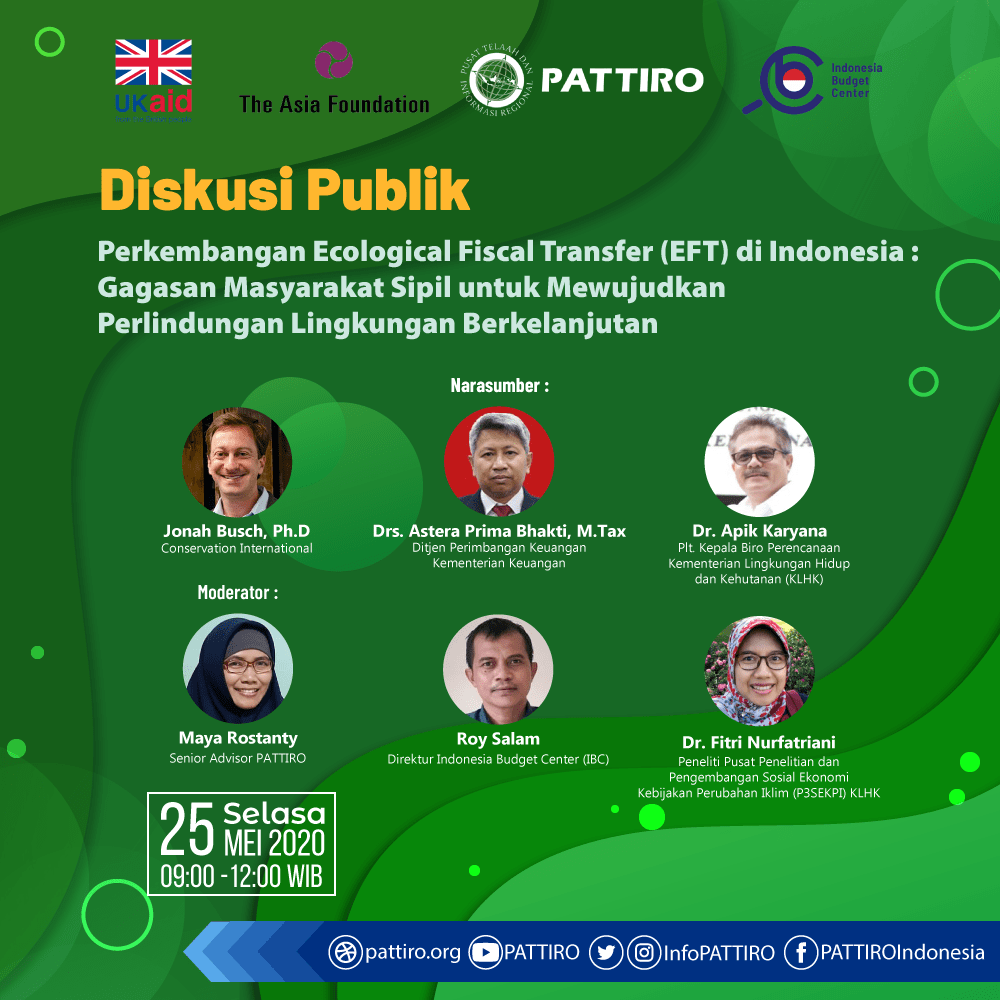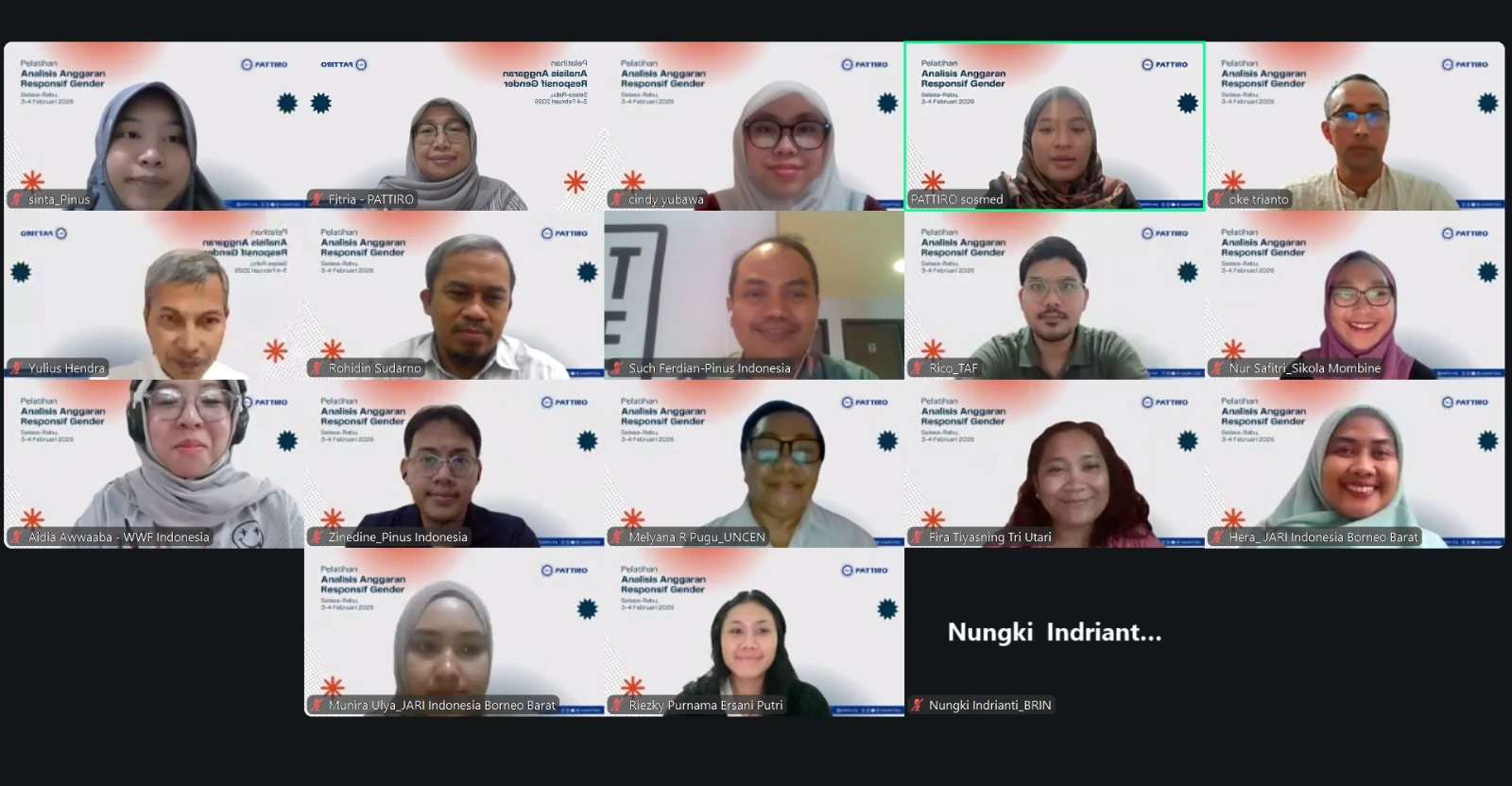
The idea of implementing the Ecological Fiscal Transfer (EFT) policy in Indonesia has continued to develop in recent years. This has been driven by the initiative of the coalition of civil society organizations from various regions together with The Asia Foundation (TAF), which proposed the concept of Ecology-based Provincial Budget Transfer (TAPE) and Ecology-based District Budget Transfer (TAKE) around 2018. Until now, the concepts of TAPE and TAKE have been adopted in six regions and are being discussed in 39 other regions, covering 13 provinces and 26 districts/cities in Indonesia. At the national level, the civil society coalition is also pushing for the implementation of the Ecology-based National Budget Transfer (TANE) from the central government to local governments.
This fact surfaced in an online public discussion organized by PATTIRO and the Indonesia Budget Center (IBC) with the support of TAF on Tuesday, May 25, 2021. The activity themed “Development of Ecological Fiscal Transfer (EFT) in Indonesia” was attended by approximately 150 people consisting of of 81 men and 69 women from the central and local governments, universities, donor agencies, civil society organizations and the general public. Present as resource persons were Conservation International researcher Jonah Busch, Head of the Sub-Directorate of Revenue Sharing Funds at the Ministry of Finance (Kemenkeu) Mariana Dyah Savitri, Head of Subdivision for Budgeting at the Planning Bureau of the Ministry of Environment and Forestry (KLHK) Didit Sulastyo, and researcher from the Center for Research and Development of Socio-Economic Policy and Climate Change (P3SEKPI) of KLHK Fitri Nurfatriani.
In the introduction to the discussion, PATTIRO Executive Director Bejo Untung highlighted that the development of EFT in Indonesia has been very significant. This is marked by the adoption of TAPE and TAKE in various regions as well as the massive levels of discussion process being carried out in various regions. According to him, this development needs to be discussed at the global level so that support for EFT in Indonesia becomes more widespread. Meanwhile, TAF Indonesia Country Representative Sandra Hamid conveyed that the development of EFT that had been carried out in the regions needed to be balanced with the TANE policy at the national level so that efforts to encourage environmental protection could continue to be sustainable, including as an effort to support the achievement of the target for reducing greenhouse gas (GHG) emissions.
On that occasion, IBC Director Roy Salam, representing the coalition of civil society organizations, explained the development of TAKE, TAPE, and TANE in Indonesia. According to him, as many as 13 provinces and 26 districts/cities have been assisted by civil society organizations to implement the TAKE and TAPE concepts. In practice, the application of the EFT approach has been adapted to the context and needs of each region. “In Siak Regency, Riau, the coalition is pushing for the Green Village Index to be one of the indicators whose funding is driven by the TAKE scheme, while the indicators applied in TAPE in North Kalimantan Province are generally directed at maintaining green open spaces, reducing deforestation, reducing water and air pollution. and waste management,” said Roy. Furthermore, the coalition of civil society organizations at the national level, including PATTIRO and IBC, has also conveyed the idea of TANE to the government, including through the Regional Incentive Fund (DID) scheme. The Coalition proposes that DID performance assessment can be expanded not only to the waste management performance category but to be more comprehensive with other environmental protection performance categories.
Meanwhile, Fitri Nurfatriani expressed her appreciation for the efforts of civil society groups. She and her team at P3SEKPI have also conducted a study on EFT, whose finding shows the challenges in implementing EFT in Indonesia, namely the selection of indicators set out in the EFT scheme. According to her, the selection of these indicators must be adjusted to the conditions and needs of the region and the most important thing is the periodic availability of data. This is also important to consider when promoting EFT at the national level, where the selection of indicators needs to take into account the availability of data in the regions. “For some data such as the Data Quality Index (IKU) and the Water Quality Index (IKA), not all districts or provinces may have been able to calculate. So, this is our consideration if we want to determine the EFT indicators, especially at the national level,” said Fitri.
Fitri hopes that the TANE concept can be adopted by the government so that Indonesia can catch up with other countries that have implemented EFT nationally. As stated by Jonah Busch, currently there are several countries that have implemented EFT such as Brazil, Portugal, China, India, and France. According to Jonah, the support from various countries in the world to provide the EFT budget every year has continued to increase, from US$ 6 billion in 2011 to US$ 23 billion. However, this amount is still minuscule compared to the amount of fiscal transfers channeled by these countries to the regions, which reached US$4.9 trillion/year. In terms of the EFT scheme, Jonah emphasized that learning from the implementation of EFT in other countries, the EFT scheme of each country does not have to be the same, but must be adapted to the needs of each country. In line with Fitri, Jonah also highlighted the importance of data availability as an important factor in determining EFT indicators and the role of civil society groups in order to encourage a stronger EFT legal umbrella in the regions to ensure the sustainability of EFT.
Ministry of Finance resource person Mariana Dyah Savitri said that the Transfer to Regions and Village Fund (TKDD) scheme for ecology has currently been implemented through the Natural Resources Revenue Sharing Fund (DBH-SDA), especially the DBH DR, Special Allocation Fund (DAK), DID, regional grants and Village Funds. “In general, the funds transferred to the area are used to support ecology,” said Mariana. Regarding the opportunity for EFT through DID, she believes that as part of TKDD, DID needs to become an instrument to encourage better local behavior in environmental care. The Ministry of Finance is committed to encouraging the implementation of a performance-based and reward-based financial management scheme as well as a more effective approach to financial management.
Meanwhile, Didit Sulastyo expressed his appreciation to civil society and academics who had initiated the TAKE, TAPE, and TANE concepts. Didit said that currently the KLHK is carrying out several corrective actions related to strengthening the performance of LHK management, namely conducting a study to develop DID indicators in the field of Environment and Forestry. The process is currently entering the stage of in-depth studies such as the principles and conditions for selecting selected indicators, selected criteria and indicators and simulating DID indicators by considering weighting and assessment. According to him, this study is based on the consideration that the current DID indicators have not adequately pushed and integrated the issue of biodiversity conservation and sustainable living environment.
The development of the DID LHK indicator that is being carried out by the Ministry of Environment and Forestry is very relevant to the efforts of the civil society coalition to encourage the TANE policy. The development of DID indicators needs to be directed towards realizing wider environmental and forestry protection. (Andwi Joko/Ramlan Nugraha)





